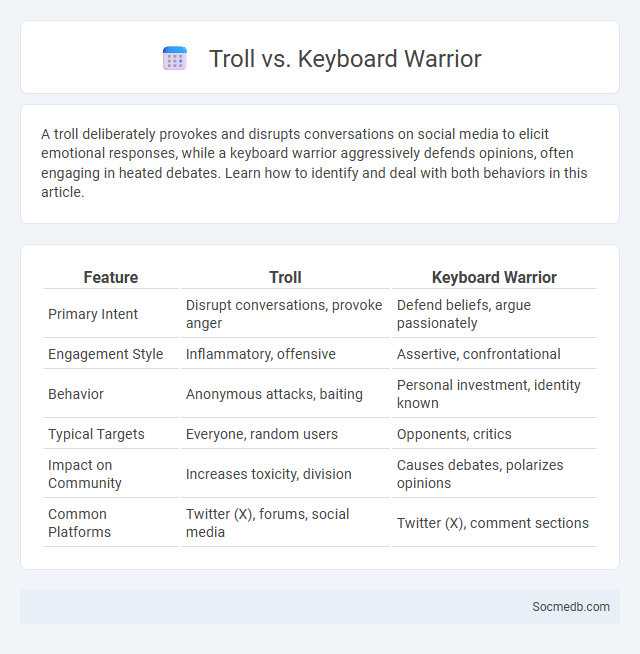
Photo illustration: Troll vs Keyboard Warrior
A troll deliberately provokes and disrupts conversations on social media to elicit emotional responses, while a keyboard warrior aggressively defends opinions, often engaging in heated debates. Learn how to identify and deal with both behaviors in this article.
Table of Comparison
| Feature | Troll | Keyboard Warrior |
|---|---|---|
| Primary Intent | Disrupt conversations, provoke anger | Defend beliefs, argue passionately |
| Engagement Style | Inflammatory, offensive | Assertive, confrontational |
| Behavior | Anonymous attacks, baiting | Personal investment, identity known |
| Typical Targets | Everyone, random users | Opponents, critics |
| Impact on Community | Increases toxicity, division | Causes debates, polarizes opinions |
| Common Platforms | Twitter (X), forums, social media | Twitter (X), comment sections |
Understanding the Terms: Troll vs Keyboard Warrior
A troll deliberately provokes or disrupts online conversations by posting inflammatory or off-topic messages to elicit strong emotional responses. A keyboard warrior aggressively defends their views or attacks others behind the anonymity of a screen, often exhibiting confrontational behavior. Understanding these distinctions helps you navigate social media interactions more effectively and maintain a balanced digital environment.
Origins and Evolution of Online Trolling
Online trolling originated in the early internet forums of the 1990s, where users began intentionally provoking others through inflammatory or off-topic messages. The evolution of trolling accelerated with the rise of social media platforms such as Facebook, Twitter, and Reddit, enabling trolls to reach wider audiences with anonymity and speed. Modern trolling tactics now include coordinated harassment campaigns and disinformation, impacting online discourse and digital culture globally.
What Defines a Keyboard Warrior in Digital Spaces?
A keyboard warrior is defined by aggressive, confrontational behavior in digital spaces, often hiding behind anonymity to provoke or attack others online. Your interactions may be influenced by such individuals who use social media platforms to express extreme opinions without face-to-face accountability. Understanding this behavior helps you navigate online communities with greater awareness and resilience.
Troll Tactics: Strategies and Motivations
Troll tactics on social media involve spreading misinformation, provoking emotional reactions, and disrupting conversations to gain attention or push specific agendas. Motivations behind these actions range from seeking amusement and exerting influence to promoting ideological beliefs or causing harm to targeted individuals or groups. Understanding these strategies helps you recognize and mitigate the impact of online trolls on your digital interactions.
Keyboard Warriors: Methods and Mindset
Keyboard warriors often employ aggressive tactics such as relentless commenting, targeted harassment, and spreading misinformation to dominate online discussions. Their mindset involves anonymity-fueled confidence and a desire to provoke emotional reactions or assert dominance in social media spaces. Understanding these methods helps you navigate digital interactions more safely and maintain control over your online experience.
Key Differences between Trolls and Keyboard Warriors
Trolls deliberately provoke and disrupt online conversations by posting inflammatory or off-topic messages, seeking to incite emotional reactions from others. Keyboard warriors, on the other hand, are characterized by aggressive or confrontational behavior in debates, often standing firmly behind their opinions without necessarily aiming to derail discussions. Understanding these distinctions helps you navigate social media interactions more effectively, maintaining constructive engagement and avoiding unnecessary conflicts.
The Impact of Trolls and Keyboard Warriors on Online Communities
Trolls and keyboard warriors significantly disrupt online communities by spreading misinformation, inciting conflicts, and fostering hostile environments that deter constructive dialogue. Their persistent negative behavior reduces user engagement and erodes trust, leading to fragmented digital spaces and diminished community cohesion. Effective moderation strategies and AI-driven content filtering are essential to mitigate their impact and promote healthier interactions on platforms like Facebook, Twitter, and Reddit.
Spotting the Signs: How to Identify Each Type
Spotting the signs of different social media platforms involves recognizing their unique features and user behaviors to tailor your engagement effectively. Instagram emphasizes visual content such as photos and short videos, while Twitter focuses on concise text updates and real-time trending topics. Your ability to identify these distinct characteristics improves your social media strategy and helps connect with the right audience on each platform.
Handling Trolls and Keyboard Warriors Effectively
Handling trolls and keyboard warriors effectively requires setting clear boundaries and not engaging with inflammatory comments that seek to provoke emotional responses. You can use platform tools such as blocking, muting, and reporting to maintain a positive online environment while protecting your mental well-being. Consistently promoting respectful dialogue helps foster a supportive community and minimizes the impact of disruptive behavior.
The Future of Online Interactions: Can Civility Prevail?
The future of online interactions hinges on fostering digital civility through advanced AI moderation tools and community-driven content policies. Research indicates platforms implementing transparent algorithms and user accountability mechanisms experience a 30% reduction in toxic behavior. Emphasizing emotional intelligence and empathy in virtual communication can reshape social media into constructive spaces that prioritize respectful dialogue and meaningful engagement.
 socmedb.com
socmedb.com